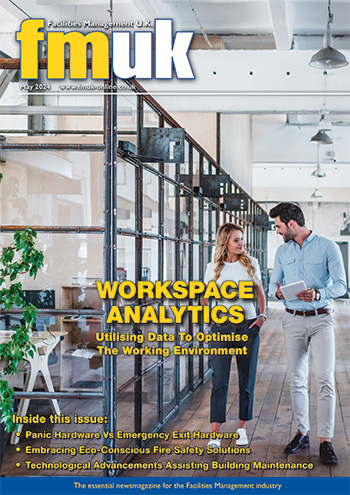How On-Site Composting Of Food Waste Can Reap Significant ESG Wins

In this feature, Huw Crampton, of food waste solutions expert Tidy Planet, explores how improving management of food waste can significantly bolster institutions’ ESG performance.
The Problem Of Waste
Waste management is an area that has the potential to present a range of challenges for facility management professionals.
From overspending on supplies, and managing fluctuating costs, to excessive waste being sent to landfill — this area of responsibility can lead to multiple problems from a financial, practical and environmental perspective.
Waste management issues, and the types of material needing to be disposed of, differ for each organisation — but food waste remains a common and widespread problem.
In fact, research has shown that food waste has topped all other waste streams — including plastic and cardboard — as the material that organisations are most concerned about.
Findings have revealed that in order to reduce their company’s carbon footprint, 46% of the country’s businesses have ‘recycling food waste’ at the top of their priority list — with 33% having ‘reducing food waste’ in third position.
It’s clear that food waste is a big issue — but how can FMs implement effective waste management solutions that don’t compromise their wider sustainability agenda?
Composting — A Sustainable Solution
One solution is through investing in sustainable, closed-loop recycling and composting technology.
Food waste accumulates quickly, so traditional methods of disposal are not sustainable in the long-term, from either a financial or an environmental viewpoint.
Relying on bins, for example, demands frequent collections, which can be costly — as well as contributing towards increased carbon emissions. This can be highly problematic for FMs, who are working to restricted budgets, or looking to achieve short and long-term environmental goals.
Composting on site, however, offers a sustainable way of dealing with food or green waste, converting it into a valuable resource that is rich in nutrition, and organic matter, and therefore ideal for capturing carbon and improving soil quality.
A reduction in the quantity of pungent waste bins also cuts down on pests and vermin — simultaneously improving on-site hygiene and minimising spend on preventative measures.
Engaging With ESG
The sustainable benefits of high-quality composting machines mean they play a pivotal role in bolstering an organisation’s ESG (environmental, social and governance) performance.
ESG is of course a hot topic in the business world, as the standards a business sets in these three areas are the key criteria by which sustainability credentials are evaluated.
This is therefore a crucial framework for FMs to engage with, to advance their organisation’s green credentials and work towards ambitious goals, such as net zero.
Sustainable composting solutions bring notable ESG wins — especially in terms of the environment. The right composter converts food waste through natural processes on-site, using minimum energy.
As already mentioned, It removes the need for transportation of materials to other locations, helping to keep the carbon footprint as low as possible.
While eliminating food waste, the organic material it produces can be used to improve soil health and help to grow plants — essentially replacing the need for artificial fertilisers!
This also sequesters carbon in the ground, contributing to a significant offset against atmospheric carbon which is able to be quantified for ESG and Scope reporting.
The quantity and quality of the compost output can be monitored easily and accurately, which is more great news for FMs when it comes to benchmarking and tracking the sustainability performance of their operations.
Implementing composting technology can additionally instigate a wide range of commercial and reputational benefits for FMs. The environmental wins can be used to secure accreditation or certification, to evidence sustainability claims. This, in turn, can positively shape reputations — and attract investment from like-minded businesses, who are looking to expand their green portfolio.
Looking Forward
Composting technology is an effective and sustainable solution to waste management challenges faced by FMs.
By converting waste into compost at the source where it is generated, it never actually becomes a waste at all, but rather a valuable resource.
This technology could therefore essentially redefine and reinterpret the concept of waste, offering a myriad of opportunities to FMs, and their wider sustainability strategies, in the future.
Click the article to enlarge it.


























































